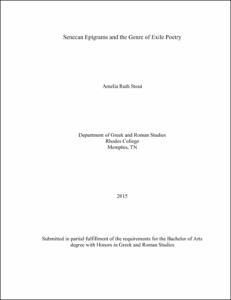Please use this identifier to cite or link to this item:
http://hdl.handle.net/10267/27453Full metadata record
| DC Field | Value | Language |
|---|---|---|
| dc.contributor.author | Stout, Amelia Ruth | - |
| dc.date.accessioned | 2016-06-06T18:49:55Z | - |
| dc.date.available | 2016-06-06T18:49:55Z | - |
| dc.date.issued | 2015-05 | - |
| dc.identifier.uri | http://hdl.handle.net/10267/27453 | - |
| dc.description | The author granted permission to publish this paper. It was submitted to the archives on a a CD. | en_US |
| dc.description.abstract | In discourses on Roman exile, several names inevitably must be brought up, with Ovid and Seneca the Younger looming large over the discussions. Ovid's exilic poems, far from simply manifesting his situation and personal feelings, were part of a literary tradition that grew over time. Ovid was aware of the previous conventions of writings from exile, and molded those concepts into a genre of exile poetry, with set tropes and guidelines to be followed by later exiles. The well-known philosopher and politician L. Annaeus Seneca was exiled on the island of Corsica by the emperor Claudius from 41 to 48 CE. While he was there he produced two philosophical consolations, several plays, and, some scholars argue, a collection of nugae, or trifles, in the form of epigrams. These epigrams demonstrate Seneca's thorough knowledge of the poetic genre of exile, due to the numerous similarities they share with the exile poetry of Ovid. Themes such as negative descriptions of the landscape of exile, exile as a living death, the immortal power of poetry, mythologizing of exile, and linguistic and cultural isolation are all used in both authors' writing and are foundations of the poetic genre of exile. By examining the Senecan epigrams in light of the concept of a literary genre of exile poetry, it is possible to understand in what way Seneca adhered to and contributed to the genre. | en_US |
| dc.description.sponsorship | This paper was read and approved by David H. Sick, Geoffrey W. Bakewell, and Clara Pascual-Argente. | en_US |
| dc.publisher | Memphis, Tenn. : Rhodes College | en_US |
| dc.rights | Rhodes College owns the rights to the archival digital objects in this collection. Objects are made available for educational use only and may not be used for any non-educational or commercial purpose. Approved educational uses include private research and scholarship, teaching, and student projects. For additional information please contact archives@rhodes.edu. Fees may apply. | - |
| dc.subject | Honors papers | en_US |
| dc.subject | Greek and Roman Studies | en_US |
| dc.title | Senecan Epigrams and the Genre of Exile Poetry | en_US |
| dc.type | Thesis | en_US |
| Appears in Collections: | Honors Papers | |
Files in This Item:
| File | Description | Size | Format | |
|---|---|---|---|---|
| Amelia Stout Final Honors Project 2015.pdf | 391.77 kB | Adobe PDF |  View/Open |
Items in DSpace are protected by copyright, with all rights reserved, unless otherwise indicated.